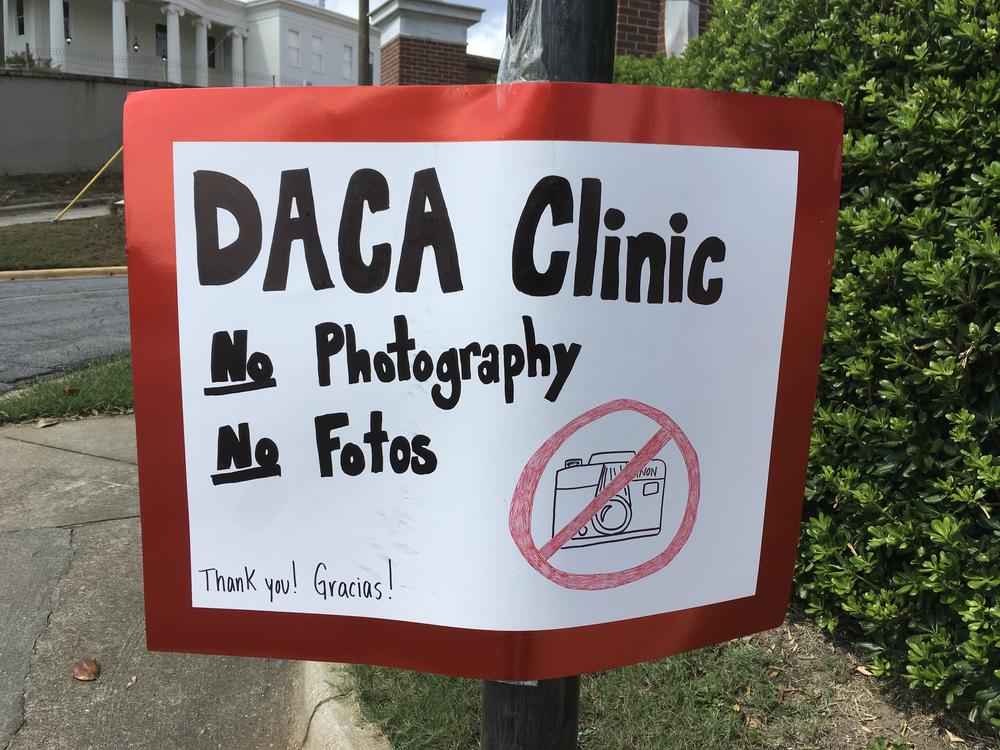Section Branding
Header Content
DACA Recipients Rush To Meet Deadline
Primary Content
Earlier this month President Trump rescinded the Deferred Action for Childhood Arrivals policy (DACA), a program that allows undocumented immigrants brought to the United States as children to remain here. The changes impact 24,000 DACA recipients here in Georgia. But the action also includes a grace period as long as people apply by October 5.
GPB's Josephine Bennett visits a DACA renewal clinic in Macon.
When DACA was rescinded applicants whose status was set to expire in the next 6 months were given one last chance to apply. But the October 5 deadline is fast approaching for DACA recipients like Maria Meraz from Eatonton.
She said, “I was six years old when I came to the United States and up until I was 19 that’s when I was able to apply for DACA. I was here without the status until DACA came in play.”
And having DACA meant she was able to go to college, become a dental assistant and support her two year-old son.
But the DACA application can be complicated. It’s 10 pages long and requires documentation of education, work history and housing. So Maria is getting help at a free renewal clinic at Mercer University’s School of Law.
It’s one of 10 clinics that were held across Georgia and one of the few south of Atlanta. It was staffed by attorneys and law students like Jocelyn Calvillo who is getting hands-on experience with clients. But for her it’s personal.
She said, “I have two of my cousins who are currently DACA recipients and fortunately for them they were able to renew before the deadline.”
Calvillo said there’s lots of uncertainty and fear among young people.
“Many of them know just English or very limited Spanish and so to be taken somewhere like Mexico or El Salvador it’s unfathomable for them because what do you do there?” she said. “You’ve been raised here. You’ve created a future for yourself here and with DACA being rescinded what do you do now?”
But she said the DACA program is not a permanent fix, it’s just a promise that you will not be deported as long as you meet stringent requirements.
Mark Jones teaches immigration law at Mercer. He said any fix needs to be permanent.
“The real solution to all this is not what we’re doing today, it’s the Dream Act,” he said. “And you know President Trump says he supports a solution like that so the question is how to make it happen.”
The Dream Act failed in 2007. But a similar bill put forward by Democrat Dick Durbin and Republican Lindsay Graham has been introduced in the Senate.
That’s good news for the thousands of people in Georgia under DACA. Twenty percent of those need to apply for extensions by next week.
Jennifer Moore practices immigration law in Macon and co-sponsored the DACA renewal clinic. She said not all DACA recipients had an unlawful entry. Many came with parents who started out with work visas.
“I see pictures of people’s passports and they’re little babies on their passports when they have a stamp of having entered you know or maybe they’re a year or two old,” she said.
Maria Meraz said she has few memories of Mexico and has never been back. She considers the United States home.
She said, “I don’t know about what I would be going back to cause I don’t have anything and I don’t have anyone that would tell me this is what you do or you know cause I don’t…all my family’s here.”
She said she’s hopeful Congress will act and come up with a permanent solution. But for now she’s grateful for the extra time for lawmakers to figure it out.
After visiting the clinic, I sat down with GPB's Rickey Bevington to talk more about what I saw at the clinic.
Rickey Bevington: So tell us a little more about the application process.
Josephine Bennett: The application is actually comprised of several forms like filing your taxes. Some of it is straightforward while other parts are more complex. The forms have to be filled out very carefully because if there’s a mistake, it might be kicked back to you and you’ll miss the deadline.
There’s also a $495 renewal fee, so people have to be prepared to pay that. The clinic had attorneys and law students being supervised by attorneys and they were donating their time, but many people used notaries.
And the reason they do this is that they don’t necessarily know that here in the United States, a notary does not need to be a lawyer. Student Jocelyn Calvillo plans to be an immigration lawyer, but she’s also the daughter of two immigrants. She also has family members under DACA.
“In countries like central America, Latin America, notaries are like attorneys,” Calvillo said. “So when they come here in the United States, they go to notaries for legal advice. But notaries are not attorneys, so don’t do that.”
What I heard from nearly every person that I spoke with is that when you use a notary in the United States, it can be very expensive. And the person you’re dealing with is not necessarily an attorney.
Bevington: People under DACA and who are eligible for DACA are also a big part of Georgia’s economy. What will the economic impact be if all those people have to leave?
Bennett: So according the Georgia Budget and Policy Institute, 84 percent of those receiving DACA are employed, and there are 47,000 people in Georgia currently under DACA or eligible to receive it. And they’re paying us an estimated $60 million a year in state and local taxes. They spend money on things like housing, shopping, and essentially all the things we all spend money on.
Interestingly, that $60 million figure goes up by $20 million if they gain legal status. They also hold a lot of the jobs in areas where there are shortages. Their top fields are in education and healthcare. Their payroll is about $800 million.
Maria Meraz is the DACA recipient I interviewed and she works full-time as a dental assistant. She graduated from Central Georgia Technical College and she’s been working at her job since 2015.
“My view is that I want nothing but the best for this country because it has given me more than I could ask for,” Meraz said. “I wanna give back.”
She says the way that she does this is by working hard and by being involved in her community.
Bevington: Josephine, where do things go from here? What are the next steps here in Georgia?
Bennett: When Donald Trump rescinded DACA, he also called on Congress to come up with a permanent replacement within the next six months. That’s when the status of other recipients who applied earlier will fall out of compliance and they’ll start losing their protections.
There’s bipartisan support for a solution, including a current Senate bill version of the Dream Act by Dick Durbin and Lindsey Graham. However, earlier this month, the two lawmakers were calling on a solution by the end of this month and that has not happened. Republican Tom Cotton, a Senator from Arkansas, says the Graham-Durbin bill would amount to amnesty, which he defines as giving legal status to people who arrived here illegally.
So while there is bipartisan support, the question is just how much? I think Macon immigration attorney Jennifer Moore summed it up pretty well.
“It’s in the hands of Congress at this point and we just don’t know what they’re going to do,” Moore said. "And given their recent track record, I would say it’s completely up in the air.”
And that’s all we know. I think, at this point, we just need to stay tuned.
Correction: An earlier version of this story referred to Mark Jones of Mercer University as Mark Johnson. The story has been updated with the correct name.



